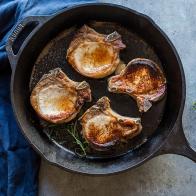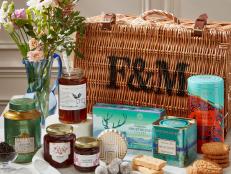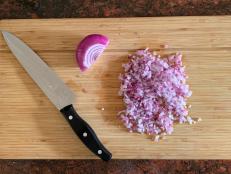10 Important Food Moments in Black History
These expert chefs and tastemakers shaped food and cooking in American life — and left us with lots of delicious bites still worth celebrating.


James Marshall/Getty
Edna Lewis stands in the dining room of the Gage & Tollner restaurant.
When we talk about Black history, the focus is too often on the things Black Americans have overcome, and celebrating what the community has contributed to history comes second. From being enslaved, to fighting for equality in every area of society, Black history is filled with layers of moments that continuously deserve conversation — and that means having them well past Black History Month.
While ongoing events targeting Black Americans have undeniably boosted the attention toward many Black chefs and restaurateurs, Black businesses and Black-owned restaurants, Black figures have long been making an impact in the food and beverage space. In fact, many of today’s popular styles of cooking derive from Black culture, and you can even thank a few Black figures for some of your go-to household items.
You likely think of soul food when it comes to the impact that Black people have had in the food realm; but history shows Black people have done much more than that. From inventing the ice cream scooper to putting both Creole and southern cuisine on the international map, here are ten of the most important food moments in Black history.
1813: Peter Hemings becomes the country’s first master brewer.
If you’ve taken a sip of a beer lately, you can thank Peter Hemings for that. Born into slavery just before the Revolutionary War, Peter — through his older brother, James — was taught how to cook in the then “new” French style of cooking he learned while serving Thomas Jefferson in France. James hoped teaching Peter to cook would put him on the path to freedom. James’s negotiation with Jefferson worked out in his younger brother’s favor by placing him in the position to become America’s first master brewer.
Taking up the task of brewing in 1813, the younger Hemings brother then took charge of the brewing and malting operations at Monticello. As noted by Jefferson, Hemmings learned the craft “with entire success” all while possessing “great intelligence and diligence.”
Today, both Hemings brothers are highly regarded as America’s first Black “celebrity” chefs.
1866: Malinda Russell publishes A Domestic Cookbook.
While there are few details known about Malinda Russell’s life, that hasn’t stopped her from making history. Born in or around 1812 in Tennessee, the now-historical figure was a freed slave who possessed a high level of education. After traveling to Virginia — and arriving penniless after being robbed by a fellow traveler — she took employment working for a family as a nurse and traveling companion. It was there that she learned to cook, thanks to another freed woman, Fanny Steward, and honed in on her craft of baked goods.
After a few tragedies (her husband, Anderson Vaughn, passed four years after she gave birth to their disabled son), Russell returned to Tennessee to operate a boarding house and shortly after, a successful pastry shop. In 1864, however, she fled to Michigan and just two short years later, she self-published the first known cookbook by a Black woman: A Domestic Cook Book: Containing a Careful Selection of Useful Recipes for the Kitchen.
The cookbook, which featured a number of elegant desserts such as rose cake and floating islands (a dessert consisting of meringue floating on creme anglaise) was quite unique, as it contained no traditional soul food items that southern cuisine is known for.

Alfred L. Cralle/Carnegie Library/Creative Commons
1897: Alfred L. Cralle is awarded the patent for his "Ice Cream Mold and Disher" invention.
While you may not regularly hear the name Alfred L. Cralle, if you love to eat ice cream, it’s time you knew that you have this Black inventor to thank for the ease you have in scooping it out of its tub.
Born in 1866, Cralle worked with his father in the carpentry industry before becoming interested in mechanics. After being sent to Washington, D.C. to attend Wayland Seminary, he eventually settled in Pittsburgh, Pennsylvania, serving as a porter in a drug store and at a hotel. It was at the latter location, he received the idea to develop the ice cream scoop after noticing workers had issues with the dessert sticking to serving spoons.
As a result of that job, Cralle applied for the patent on the then-named “Ice Cream Mold and Disher” on June 10, 1896. And less than a year later on June 10, 1896, he was awarded U.S. Patent #576395, which we now know to be the ice cream scooper.
1910s: Jones Bar-B-Q Diner opens in Marianna, Arkansas
Whether you’ve been to the small town of Marianna, Arkansas or this is the first time you’ve ever heard of it, there’s one thing you need to know:: it boasts some of the best barbecue you’ll ever have.
Home to what is believed to be the nation’s oldest continuously operating Black-owned restaurant, Jones Bar-B-Q Diner was first opened by Joe Jones. Today, James and Better Jones own it, and while the exact date the operation began is disputed, the food they deliver today out of the small diner is not.
Originally only serving barbecue on Friday and Saturday, the latest James Beard Award-winning iteration of the former “Hole in the Wall” restaurant has been in the same place it’s been since 1964 and now operates from 7:00 a.m. until selling out.

Paul Natkin/Getty
Leah Chase in the kitchen of Dookie Chase's in New Orleans, Louisiana on January 19, 2015.
1941: Dooky Chase’s Restaurant opens its doors.
Initially just a sandwich shop and lottery ticket outlet, Dooky Chase’s Restaurant has now grown to be a thriving family restaurant located in Louisiana. Founded by Edgar “Dooky” Chase Sr. and his wife Emily, the then-sandwich shop saw its transition into a sit-down restaurant filled with culture through a vision that Dooky Chase Jr.’s wife, Leah Chase, had. And the rest, as they say, is history.
Becoming the hot spot for Civil Rights leaders in New Orleans, Dooky Chase frequently hosted prominent members of the African American community such as Thurgood Marshall, Martin Luther King Jr., freedom fighters like Oretha Castle Haley and Virginia Durr, and other civil rights activists as they strategized over meals in the upstairs meeting room.
As time went on, Leah Chase was dubbed the “Queen of Creole Cuisine” and is revered for inviting any and everyone to eat at Dooky Chase’s while bringing the New Orleans Creole cooking to international attention.

Sierra Nicole Rhoden/Chicago Tribune/Getty
Lena Richard
1949: Lena Richard becomes the first Black woman to host her own televised cooking show.
Born in 1892, Lena Richard is a Louisiana legend. Moving to New Orleans from New Roads, Louisiana at an early age, Richard helped her mother and aunt as they were domestic servants to Alice and Nugent Vairin. Spending most of her time in the kitchen after school, Richard was quickly hired by the family once she graduated high school. A few years later, the Vairin family sent the budding cook to cooking school in both New Orleans and Boston, with Richard graduating from the Fannie Farmer School in 1918. Returning to New Orleans shortly after, Richard opened up her own catering business and started a number of other businesses (like the cooking school she opened with her daughter in 1937) as well as working as a cook at the elite Orleans Club — an organization for white women.
In 1939, Richard self-published her first cookbook, Lena Richard’s Cook Book and just a year later, publisher Houghton-Mifflin reissued it with the title New Orleans Cook Book. This cookbook spearheaded the next season of her life; she became head chef at New York’s Bird and Bottle Inn, then opened her own restaurant — Lena’s Eatery — in 1941, was the chef at Travis House from 1943-1945, and in 1946, began her own frozen food business featuring fully cooked packaged dinners sold nationwide. Her last restaurant, The Gumbo House, opened in 1949 — the same year her 30-minute cooking show, Lena Richard’s New Orleans Cook Book, debuted on New Orleans’ first television station, WDSU.
Though the show only aired from 1949 to 1950, it was a monumental moment in Black history as it etched her down as the first Black woman to host a televised cooking show. The show aired twice each week and saw Richard — along with her assistant, another Black woman by the name of Marie Matthews — deliver guided recipes from her legendary cookbook.
1976: Edna Lewis releases her second cookbook, The Taste of Country Cooking, breaking barriers for Black women and southern cuisine.
If you’ve heard the name Edna Lewis, chances are you know a little something about what she’s contributed to Black American food history. While she’s most widely known as “The Grande Dame of Southern Cooking,” Edna — a renowned chef, restaurateur, culinary ambassador, and author — made a huge impact when she released her second cookbook, The Taste of Country Cooking.
Hitting shelves in 1976 (which was just four years after her first cookbook, The Edna Lewis Cookbook, was released), the cookbook quickly became revered as the book that brought the attention back to genuine southern cooking. And, as a result, it became one of the first cookbooks by a Black woman to reach a national audience. Delivering a high caliber of knowledge, relatability and expertise, readers have been able to learn both history and recipes of the south through Edna’s personal culinary lens.
1999: Patti LaBelle releases her first cookbook, LaBelle Cuisine: Recipes to Sing About.
Before iconic songstress Patti LaBelle was taking over grocery store shelves with her infamous pies, she was making her way in households with her first cookbook, LaBelle Cuisine: Recipes to Sing About.
Released in 1999, the cookbook — which hit shelves the same year as her 20th Century Masters — The Millennium Collection: The Best of Patti LaBelle album — served as one of the first cookbooks to be released by a major entertainment act. Filled to the brim with soulful stories and recipes like macaroni and cheese, gumbo and more, the cookbook still finds itself nestled comfortably on the shelf of many home cooks today. Now, entertainment acts from all avenues are stepping into the food industry and taking it just as seriously as the legendary songstress did more than 20 years ago.
2019: Chef Mariya Russell becomes the first Black American woman to be awarded a Michelin star.
If you know anything about the restaurant business, you know that receiving a Michelin star is one of the highest honors. While Michelin stars date back to 1900, it wasn’t until 2019 that the first Black woman was awarded one.
American chef and restaurateur Mariya Russell received the honor for her work as chef at Chicago’s Kumiko and Kikkō Japanese dining bar just days after her 30th birthday, and with it, the Ohio native changed the history of a more than 100-year-old award system. As a result, the restaurant — thanks to her contribution — also went on to receive the Best New Restaurant award from Food & Wine the same year. And in the following year, Russell was a James Beard Award semi-finalist.
2022: Nourish + Bloom, the world’s first Black-owned autonomous grocery store, opens in Georgia.
Founded by Jamie Michael Hemmings and Jilea Hemmings, Nourish + Bloom opened its doors in 2022 in Fayetteville, Georgia — a city located about 30 minutes outside of Atlanta. Delivering a cashier-less shopping experience that relieves the stress of shoppers standing in line for check-out, shoppers are charged based on the items they pick up and payment is made through an app that you sign up for prior to shopping.
Though not expansive in size like big box retailers such as Walmart, Target, or Costco, the small grocery store is nestled in a community making it the perfect low-lift neighborhood shopping experience to pick up go-to items you need on the daily. The added plus? There’s even a bistro that offers items that can also be ordered and paid for through the app.
























































